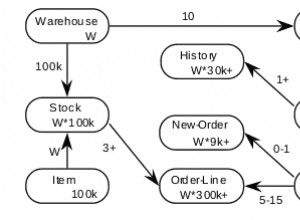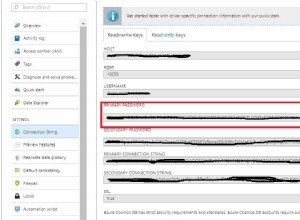Il punteggio si basa sul numero di partite derivate, ma esiste anche un coefficiente integrato che regola il punteggio delle partite rispetto alla lunghezza totale del campo (con stopword rimosse). Se il tuo testo più lungo include parole più rilevanti per una query, questo si aggiungerà al punteggio. Il testo più lungo che non corrisponde a una query ridurrà il punteggio.
Snippet dal codice sorgente di MongoDB 3.2 su GitHub (src/mongo/db/fts/fts_spec.cpp ):
for (ScoreHelperMap::const_iterator i = terms.begin(); i != terms.end(); ++i) {
const string& term = i->first;
const ScoreHelperStruct& data = i->second;
// in order to adjust weights as a function of term count as it
// relates to total field length. ie. is this the only word or
// a frequently occuring term? or does it only show up once in
// a long block of text?
double coeff = (0.5 * data.count / numTokens) + 0.5;
// if term is identical to the raw form of the
// field (untokenized) give it a small boost.
double adjustment = 1;
if (raw.size() == term.length() && raw.equalCaseInsensitive(term))
adjustment += 0.1;
double& score = (*docScores)[term];
score += (weight * data.freq * coeff * adjustment);
verify(score <= MAX_WEIGHT);
}
}
Impostazione di alcuni dati di test per vedere l'effetto del coefficiente di lunghezza su un esempio molto semplice:
db.articles.insert([
{ headline: "Rock" },
{ headline: "Rocks" },
{ headline: "Rock paper" },
{ headline: "Rock paper scissors" },
])
db.articles.createIndex({ "headline": "text"})
db.articles.find(
{ $text: { $search: "rock" }},
{ _id:0, headline:1, score: { $meta: "textScore" }}
).sort({ score: { $meta: "textScore" }})
Risultati annotati:
// Exact match of raw term to indexed field
// Coefficent is 1, plus 0.1 bonus for identical match of raw term
{
"headline": "Rock",
"score": 1.1
}
// Match of stemmed term to indexed field ("rocks" stems to "rock")
// Coefficent is 1
{
"headline": "Rocks",
"score": 1
}
// Two terms, one matching
// Coefficient is 0.75: (0.5 * 1 match / 2 terms) + 0.5
{
"headline": "Rock paper",
"score": 0.75
}
// Three terms, one matching
// Coefficient is 0.66: (0.5 * 1 match / 3 terms) + 0.5
{
"headline": "Rock paper scissors",
"score": 0.6666666666666666
}




